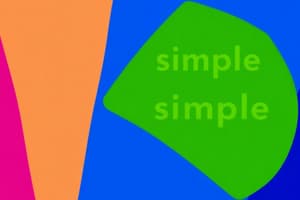Podcast
Questions and Answers
Which sentence correctly uses the past simple tense?
Which sentence correctly uses the past simple tense?
- Did you see the game tomorrow?
- He finished his homework, then went to bed. (correct)
- They will travel to Spain last year.
- She doesn't like the movie yesterday.
What is the correct negative form of the verb 'enjoy' in past simple tense?
What is the correct negative form of the verb 'enjoy' in past simple tense?
- He didn't enjoyed the concert.
- He didn't enjoy the concert. (correct)
- He enjoyed not the concert.
- He don't enjoy the concert.
Which time expression is most commonly associated with the past simple tense?
Which time expression is most commonly associated with the past simple tense?
- This morning
- Currently
- Next week
- In 2010 (correct)
Identify the transformed form of the verb 'go' in past simple tense.
Identify the transformed form of the verb 'go' in past simple tense.
Which of the following is an example of a sequential action in past simple tense?
Which of the following is an example of a sequential action in past simple tense?
Flashcards are hidden until you start studying
Study Notes
Past Simple Tense
-
Definition: The past simple tense is used to describe actions that were completed at a specific time in the past.
-
Formation:
- Regular verbs: Add -ed to the base form.
- Example: walk → walked
- Irregular verbs: Change the base form in unique ways (no specific rule).
- Example: go → went
- Regular verbs: Add -ed to the base form.
-
Usage:
- Completed actions: Actions that started and finished in the past.
- Example: She visited Paris last year.
- Specific time references: Often used with time expressions indicating when the action occurred.
- Example: I saw the movie yesterday.
- Sequential actions: Describing a series of completed actions.
- Example: He finished his homework, then went to bed.
- Completed actions: Actions that started and finished in the past.
-
Negative Form:
- Use "did not" (didn't) + base form of the verb.
- Example: She did not (didn't) like the movie.
- Use "did not" (didn't) + base form of the verb.
-
Interrogative Form:
- Use "Did" + subject + base form of the verb.
- Example: Did you see the game?
- Use "Did" + subject + base form of the verb.
-
Common Time Expressions:
- Yesterday
- Last week/month/year
- In 2010
- An hour ago
- Two days ago
-
Examples:
- Affirmative: They traveled to Spain.
- Negative: He didn't eat breakfast.
- Interrogative: Did she attend the meeting?
-
Key Points:
- The past simple tense emphasizes the completion of an action.
- It is one of the most commonly used tenses in English for storytelling and recounting past events.
Definition
- The past simple tense describes actions that were completed at a specific time in the past.
Formation
- Regular Verbs: Formed by adding -ed to the base form (e.g., walk → walked).
- Irregular Verbs: Change in unique ways, without a specific rule (e.g., go → went).
Usage
- Completed Actions: Refers to actions that both started and ended in the past (e.g., She visited Paris last year).
- Specific Time References: Linked with expressions that indicate when the action occurred (e.g., I saw the movie yesterday).
- Sequential Actions: Describes a series of actions completed one after another (e.g., He finished his homework, then went to bed).
Negative Form
- Constructed using "did not" (didn't) followed by the base form of the verb (e.g., She didn't like the movie).
Interrogative Form
- Formulated with "Did" + subject + base form of the verb (e.g., Did you see the game?).
Common Time Expressions
- Frequently used with time markers such as:
- Yesterday
- Last week/month/year
- In 2010
- An hour ago
- Two days ago
Examples
- Affirmative: They traveled to Spain.
- Negative: He didn't eat breakfast.
- Interrogative: Did she attend the meeting?
Key Points
- Emphasizes the completion of actions, making it essential for storytelling and recounting past events.
- One of the most frequently used tenses in English.
Studying That Suits You
Use AI to generate personalized quizzes and flashcards to suit your learning preferences.




